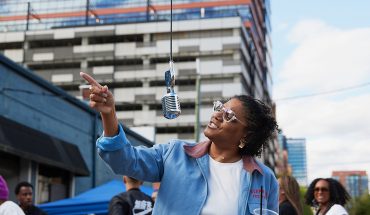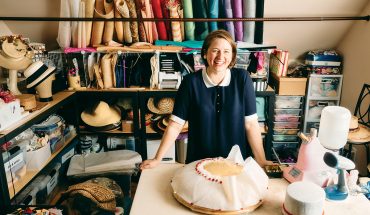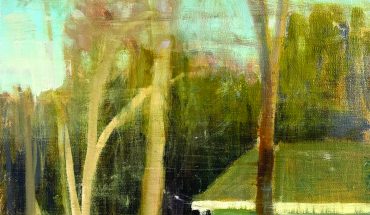
The author (at top left) with her three older siblings (clockwise from top right) Rankin McGugin, Henriette Williams-Alexander, and Judson Williams; Courtesy of Hampton Williams Hofer
by Hampton Williams Hofer
Barely eighteen and way over-packed, I left Raleigh in late August of 2005, bound for Charlottesville. I knew exactly four people in the state of Virginia, which is the way it should be. According to the quote on the back of my graduation t-shirt, taking a less traveled road would make all the difference. My parents, eager for me to confront a larger reality outside of North Carolina, had gently insisted I pick a school in another state. For a decade I stayed away, acquiring – apart from a plethora of license plates – a Swiss husband met in Tennessee, a son born in Florida, and a degree earned in Paris. Now, nearly ten years to the day since I left, I’ve chosen to make Raleigh my home again, because it turns out Robert Frost and my parents were right. It’s good to get out, but no one ever meant that you couldn’t come back.
On the morning I left for college, I noticed with little sentiment the newly erected bones of a structure that would soon be a hotel just beyond the neighborhood where I had lived my entire life. Who would need to stay in a hotel in North Hills? I wasn’t sure. We took the most scenic and direct route to Charlottesville on 15 North, a highway that snakes through small towns where eerie, deserted factories cast shadows over the little communities they once sustained. I had spent those final summer nights with my friends on the hill at Walnut Creek, swaying to country songs whose lyrics mentioned towns like these. This, it seemed to me then, was what a hometown was supposed to be: a place you leave, a place frozen in time.
Predictably, my four years in Virginia came to be defined by a certain self-discovery that I think can only happen away from the familiar. In hustling from an invigorating lecture about Faulkner’s mastery of narrative down to the bowels of the Kappa house in the throes of rush, I learned plenty – most of all to challenge what I thought I understood about people and about the world. I learned that nothing will provoke nostalgia for home quite like sipping cheap champagne to the opening chords of Wagon Wheel or spending an afternoon picking lice from the hair of Brazilian orphans. And, to my great surprise, when holidays brought me back to that neighborhood beyond a now looming and bustling Renaissance hotel, I found a city as changed as I was. Raleigh, too, seemed to be emerging from a bout of self-discovery.
The greenway was longer, the distance between coffee shops much shorter. Raleigh had a massive new convention center, a stunning airport makeover, a Stanley Cup. Things were happening. It was forward movement, even the changes that stung. The high dive at the Raleigh Racquet Club pool – the conquering of which was a pinnacle of childhood pride – had been so tall that the stairs to the top required a landing. It was gone now. Something about liability. Dogs now had to have leashes everywhere. Something else about liability. My beloved Aldert Root playground now boasted sleek and futuristic play equipment. Something about sparking creativity in youths.
By the time I finished college, Forbes.com had named Raleigh the single best city for jobs in America. Were they sure? I still couldn’t disabuse myself of the notion that I should be yearning for someplace different, couldn’t shake the images of my childhood classroom walls plastered with colorful reminders about worlds and oysters. So I looked elsewhere, taking my first job in Nashville, Tenn. I met my husband there, and Music City was rockin’, its lower Broadway district lined with rowdy honky-tonks and tourists, their professional football stadium keeping watch over it all. I thought about Raleigh’s downtown, a neatly planned grid, its streets named for the cities that had been other contenders for the title of capital. In my mind, it was just a place I went for church and Krispy Kreme. But even by that point, it had already become much more.
Graduate school led me to Paris, that dirty and beautiful mecca of art and food and light. I wanted to taste it all, marveling at the miracle of treading down the same narrow streets as Voltaire and Flaubert. “I’m from Raleigh,” I would tell people when they asked. No, not Raleigh-Durham – that’s the airport. Just Raleigh. People knew of it: their cousin worked in Research Triangle Park, or their childhood friend was a professor at N.C. State. We were on the map.
Then my husband’s job took us to Tallahassee, Fla., with its flat, hot expanses of pavement and its postcard-like live oak trees dripping in Spanish moss, and we were open to the idea of making it a permanent home. The beach was close, the people were laid-back and kind. Our son was born there, and – as often happens in the wake of a baby’s arrival – I became particularly reflective about my own childhood, at once overwhelmed with gratitude and adamant that my son have a chance to test out new training wheels on the path at the art museum, to walk to the local pharmacy on middle school afternoons. I had come to realize that Wake County schools were not the American public-school rule, but rather an excellent exception. I had been so lucky.
My husband and I were recently driving down Glenwood on our way to visit my grandmother at Mayview, our car bobbing over the bumps in the right lane around Five Points. “This is how I used to get to school,” I told him, remembering the Daytona-like dash to first period. “You drove yourself to high school?” he wanted to know. Born an ocean away, he was raised amid the trams and chocolate, the languages and turquoise lakes beneath alpine views of Switzerland. For him, the high school commute included a quick bus ride, a longer train ride, and a brief spell on a city streetcar. The Swiss can’t get driver’s licenses until they are eighteen, after they’ve already been legally drinking alcohol for years. “Yep,” I said, sitting up a little taller, “I drove myself to school.” This place would be very different for him, I realized, in more ways than the obvious.
My international husband has, as much as any other place I’ve lived, shown me my hometown through a different lens. He looks at Raleigh and sees a city as promising and as thoughtfully progressing as any other in this country. Raleigh, the rough geographic center of all the places I had come to call home, has a touch of everything, a mosaic of culture rooted in the brimming world of academia that surrounds it. Nashville is too far from the ocean, Tallahassee too far from the mountains. Charlottesville is too little, Paris too big. Goldilocks would pick Raleigh. And, to the shock of my teenage self, so would I.
They say you leave something of yourself everywhere you go, and I think that’s true. I’m happy to know there are parts of me on a tennis court in Virginia, in a winding wooden staircase in Paris. And while I’m not finished spreading the pieces, I’m humbled to know that the biggest piece – the most important one – is in a new house in an old neighborhood beyond a hotel that, just yesterday, was a grid of steel beams whose purpose evaded me. Here, my son will grow to find a city that challenges him. He may never climb the stairs to the Raleigh Racquet Club high dive, his wet hands clinging to the rail, his pulse echoing in his ears. But I look with pride at the city around me, trusting he’ll find new wonders to conquer, and one day I will encourage him to leave, knowing just maybe he’ll find his way back.



